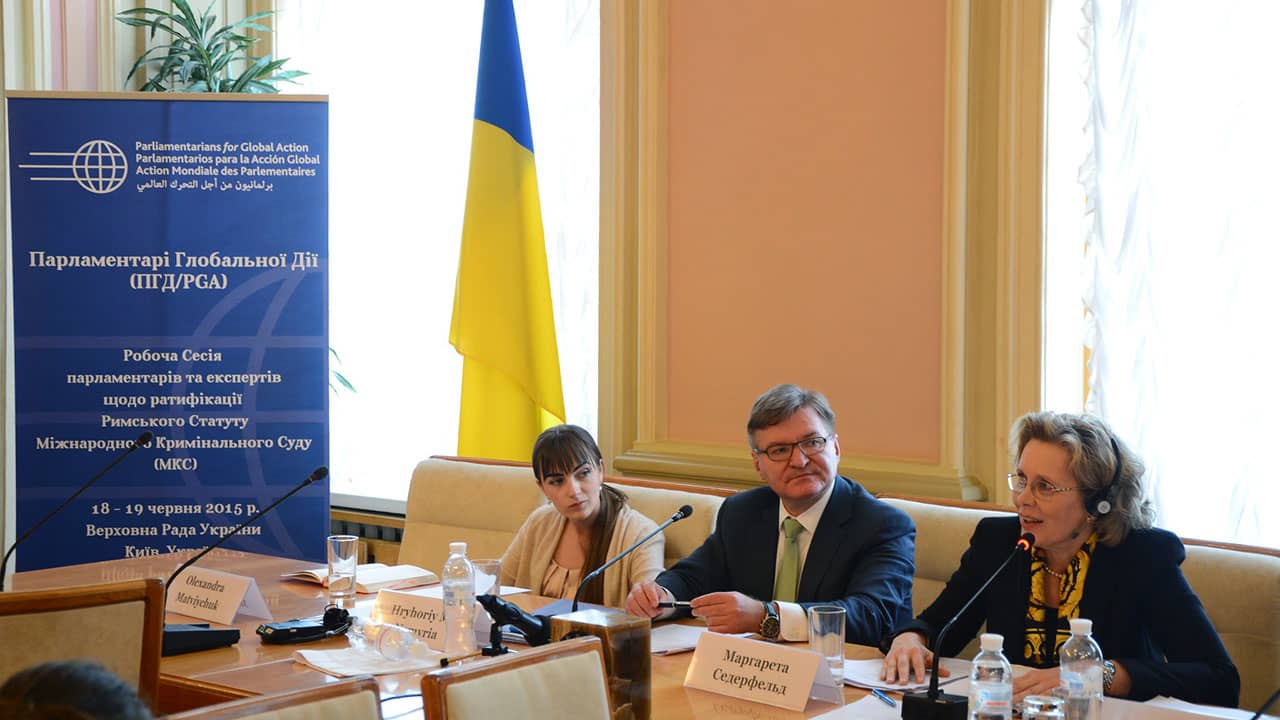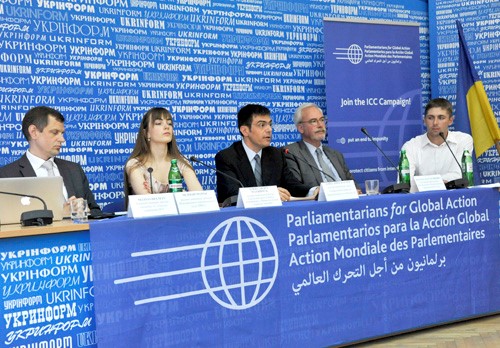
June 18-19, 2015, Verkhovna Rada of Ukraine, Kyiv
An initial phase of the political transformation in Ukraine culminated in September 2014 with the unanimous approval by the Parliament of Ukraine (“Verkhovna Rada”) of an Association Agreement with the European Union (EU), which contains two clauses (Title III, art. 24.3 and Title II, art. 8) on the ratification and domestic implementation of the Rome Statute of the International Criminal Court (ICC) by Ukraine. Following the October 2014 elections, the new “Rada” started to discuss a constitutional amendment proposal to allow the jurisdiction of the ICC in Ukraine under Article 124 of the Constitution, which may pave the way for ratification of the Rome Statute during 2015 or in early 2016.
Against this background, PGA, in partnership with the Human Rights Agenda and the Razumkov Center organized a Parliamentary Expert & Peer-Exchange Roundtable Discussions on the International Criminal Court (ICC) from June 18-19, 2015 at the Verkhovna Rada (Parliament) of Ukraine. The objectives of these discussions were to sensitize Parliamentarians and stakeholders on the Rome Statute ratification and implementation in Ukraine, to identify, address and overcome existing fears and potential obstacles towards ratification and effective implementation of the Rome Statute, as well as concerns that may lead to the postponement of the ICC Dossier.
The PGA Executive Committee was represented by the PGA Treasurer Ms. Margareta Cederfelt, MP (Sweden), who is working on Ukraine as recently appointed Rapporteur of the OSCE PA's General Committee on Political Affairs and Security. The PGA European Parliament’s National Group was represented by its Chairperson Mr. Helmut Scholz, MEP (Germany) and by Ms. Ana Gomez, MEP (Portugal).
During the Roundtable Discussions, the participants benefitted, the first day from the leadership the Chairperson of the Human Rights, National Minorities and Interethnic Relations Committee Mr. Hryhoriy Nemyria, MP (Ukraine), PGA Member, and the second day, that of the Chairperson of the Foreign Affairs Committee, Ms. Hanna Hopko, MP (Ukraine), PGA Member.
A keynote address was delivered by Mr. Victor L. Musiyaka, Deputy Chair of the Constitutional Commission of Ukraine, former Deputy Speaker of the Verkhovna Rada, who enlightened participants about the current process of amending Ukraine’s constitution to allow for ratification of the Rome Statute. The important perspective of local civil society was represented Ms. Olexandra Matviychuk, Chair of the Board, Center for Civil Liberties (CCL).
The panelists and relevant stakeholders had the opportunity to share information and their experience towards ratification and implementation of the Rome Statute with Ukrainian legislators in order to increase the level of general knowledge, understanding, and support for the work of the ICC and the impact that the Rome Statute system has on international relations and the Rule of Law. This process was facilitated by the presentations of different experts such as those of Mr. Matias Hellman, External Relations Adviser, Presidency of the ICC; Prof. Volodymyr Vasylenko, ICTY Judge; Prof. Alex Whiting, Harvard Law School and former Chief of Investigation and Prosecution at the ICC-OTP. PGA’s leading member Mr. Vitalii Kupriy, MP (Ukraine), Deputy Chair of the Committee on Legislative Support of Law Enforcement made several interventions, including to present his parliamentary initiative to amend the Constitution and allow ICC ratification.
The discussions provided for a momentous opportunity to explain any misconceptions that national legislators had about the Court and underline the advantages of being part of the Rome statute system in the fight against impunity. The Parliamentary Expert & Peer Exchange Roundtable Discussions provided a welcomed platform for legislators and local actors to voice their concerns and exchange points of view. The discussions culminated in a number of shared conclusions based on questions from the floor:
- Further delays in ratifying the Rome Statute would be a missed opportunity to provide justice for the civilian population and other protected persons on Ukrainian territories under International Law and to deter potential new atrocities;
- Giving the Court ad hoc jurisdiction over crimes of the past is not sustainable as it unduly limits the ICC to specific situations, framed in a political manner, and does not permit the fully-fledged participation of Ukraine in the Rome Statute system;
- In seeking justice for victims of recent alleged crimes (Maidan, Donbas), the ICC is not the only option. Under international law there are no statutes of limitations for the core international crimes reflected in the Nuremberg principles – which are already part of Ukraine’s criminal law – and the Rome Statute;
- Including a clear time-line for Rome Statute ratification in the negotiations could help the successful outcome of peace negotiations and fix a date of no-return for the principle of no-impunity to be applied to all groups operating within the territories of Ukraine under International Law, which include Crimea – Ratification will have a non-retroactive effect and will cover all crimes committed after the first day of the third month following the deposit of the instrument of ratification by Ukraine at the UN;
- Ukraine has an international obligation to ratify the Rome Statute under the EU-Ukraine Association Agreement.
In the framework of PGA’s visit to the Rada, the PGA delegation also had an opportunity to meet with the Head and Deputy-Head of the Fraction “People’s Will” and 11 more members of their fraction. Moreover, PGA had bilateral meetings with Members of Samopomich Union to inform about the ICC and those MPs decided to join PGA.
PGA will follow-up with the kind proposal by the Honorable Speaker of the Verkhovna Rada, Hon. Groisman, to organise a public event (e.g. a Seminar) in the Autumn of 2015, in accordance with progress in the constitutional reform process.


